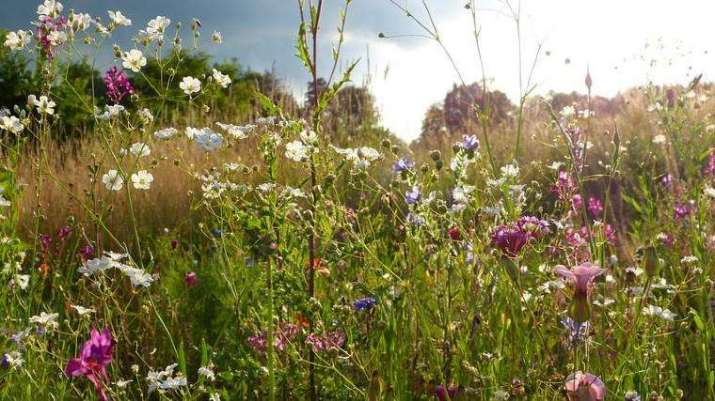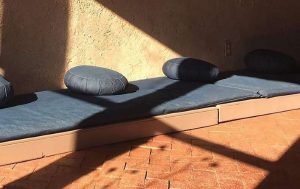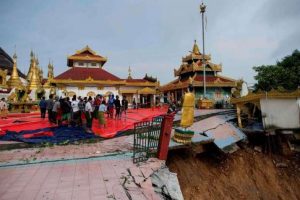
Welcome back to the Living Metta laboratory of life, taking metta meditation off the cushion and out into everyday life. Only these days it’s life, dear readers, but not as we know it.
I quarantined alone in Liverpool, which allowed an hour of daily exercise outdoors. While my spirit took refuge in Dharma, my body and mind found refuge in crack-of-dawn walks in my local park, watching the trees bud, the ducklings hatch, and dogs romp off the lead.
Last month’s article, Metta in the Kindtime, explored ways of making the quarantine meantime kinder. However, with doors slowly cracking open again, this month’s article explores making the quarantine kindtime more kick-ass.
At the time of writing, Liverpool has recorded the UK’s second-highest COVID-19 mortality rate after London, and the city council is on the verge of declaring bankruptcy. Emotions are running high, to say the least.
Frederick Law Olmsted often came to mind during my quarantine walks and the subsequent easing of lockdown measure walks. He has long been a personal hero of mine as a landscape architect of green spaces accessible to all, designing some 500 of North America’s most famous city parks (among them New York’s Central Park) and proposing natural landscapes be protected for everyone to enjoy as national parks (including California’s Yosemite National Park). His life’s work to create palatial grounds for common people was first inspired by a visit to Birkenhead Park (across the River Mersey from Liverpool), the world’s first civic park.

On my daily quarantine walks, I started noticing more and more tents appearing every dawn by the park’s small lake. At first, I assumed they were very keen anglers or people escaping cramped domestic quarters for a little breather. But each day, the piles of litter and empty beer bottles grew, the embers of bonfires lit on the grass increased, the number of wildlife harmed by fishing lines left in the water overnight multiplied, and the footpaths and benches all but disappeared under camping gear. The park has no public toilets, so the bushes served that purpose instead. As the lockdown weeks increased, so did the stench, as well as the number of sick dogs—from snacking on human feces.
This daily deterioration was heartbreaking for us regular walkers circling the footpaths like a prison yard, but the era of social-distancing made it impossible to confront the campers still snugly asleep. While most people were busy losing their cool in grocery shop queues or over the latest news report, I surprised myself in realizing that harmless pop-up tents turned out to be my lockdown trigger. Many of my fellow walkers fantasized about calling in the army or of ways to take the law into their own hands, while others cut their walks short by avoiding the lake or staying home altogether. Some of them, working as first responders or cashiers, resented that they were risking their lives everyday while others took the piss and treated the crisis like a holiday. Although we all did our bit picking up litter while the regular park maintenance team kept away, the task soon felt never-ending, and we had no way of dredging the lake of all that was being dumped into it on a nightly basis.
Wanting to feed the ducklings rather than feed the growing feeling of rage that everyone’s only current green refuge was slowly being spoiled, I experimented in finding a Middle Way for all by bringing metta and some inspiration from Frederick Law Olmsted to the situation.
Rewind to the first time I watched The Shawshank Redemption (a prison film based on a novella by Stephen King) with a friend who turned to me at the end and said simply: “Andy Dufresne is you as a man!” She was teasing me about my plodding patience, especially reflected in when Andy’s weekly library book donation letter campaign for the prison finally bore fruit and—rather than giving up when the crates of books taken out of public circulation arrived, he started to write two letters per week instead until there was an actual library in which to shelve them all.
The first day I walked past the growing mess while experimenting with metta, an idea hatched (spoiler alert, it didn’t involve digging tunnels or Rita Hayworth). I dialed the non-emergency police helpline, and explained what was happening and all the knock-on effects. I understood that the city had much more immediate problems to tackle, but as this situation affected everyone in the area on some level, asking them to move on sooner rather than later, might help avert bigger problems later in the day and calm any walkers tempted to take the law into their own hands for real. I explained to the police that most of the campers weren’t actually homeless or there to fish, but to take and sell drugs. By midday, the park would be full of frazzled parents with young children wanting to feed the ducks and enjoy some fresh air alongside the mass gathering of those looking for their next high.

And so I rang again the police every day at 5.30 a.m. with a “tent count,” much like a weather forecast, leaving it to the police to decide if any passing patrols were available to stop by and move the campers on before the daytime crowds started to arrive.
Some advisors were more understanding than others (particularly if they had small children or pets themselves). Some appreciated the funny side. Some made fun of me. Some argued fiercely. Some agreed wholeheartedly. Some remained neutral. Some blamed budget cuts. Some passed the buck to the city council or a mythical park warden. Some were on board. Some were just plain bored. What did they all have in common? Frustration that there was no box to tick on their system or obvious action to take, like with most calls. Sound familiar in today’s political clime? Slowly, it dawned on me that this saga was in fact a microcosm of the world’s current macrocosm. And until the following day, I never knew whether any patrols had stopped by as the fake fisherman all had identical green camouflage bivvies. Imagine a life-size, eight-week-long game of whack-a-mole!
Communicating those daily tent counts was my way of maintaining equanimity and trusting my own instincts over the whack-a-mole rules of so-called authority. I figured that, if nothing else, eventually there would be enough daily data for someone to make an informed decision in everyone’s best interests.
When the UK’s lockdown was eased on 13 May and actual camping grounds could reopen, the number of tents in the park unexpectedly went up rather than down! And so I kept calling each morning in order to keep my own inner peace and keep outer peace among my fellow walkers, until one day a community support officer rang me. Apparently, I had now logged enough reports to flag the park as a crime “hot spot”—a polite way of asking me to stop ringing. She was grateful that I had persevered as—due to staff illness—the park had been missed and a park warden really did exist who was meant to be checking angling permits daily (as fishing was allowed again). The officer promised to kick-start those daily rounds. Sadly, that wasn’t soon enough for an autistic teenager who was stabbed by a gang of eight young men in broad daylight a few days later.

The weekend after the stabbing, the park warden emailed me two unexpected and defensive messages asking me to please stop ringing the police, to show more compassion for the campers, and to question my mental health! With all the equanimity I could muster, I replied that everyone involved deserved compassion (including the park warden) and promised to figuratively and literally walk away now (to another park with regular police patrols).
While it’s too soon to tell whether the microcosm of my local park will return to its former peace, keeping the peace proved quite the experiment of how kick-ass kindness (a little personal metta coupled with a lot of personal equanimity) can make inroads for new solutions that benefit all sentient beings, rather than a select few. As for the macrocosm of our planet, I’m optimistic of what “new normal” a little collective metta coupled with a lot of collective equanimity could kick-start once doors slowly crack open around the world after surviving our equivalent of Andy Dufresne’s 19 years at Shawshank Prison.

I once heard a hilarious stand up routine that described how you know your life is well and truly up shit-creek when you not only start to hear voices, but a proper Morgan Freeman voiceover in your head (Freeman narrated and co-starred in The Shawshank Redemption). That said, the voiceover for his own character’s release from prison gives me great hope for our release from lockdown and the new solutions yet to emerge for all sentient beings after wading through our collective shit-creek:
I think it’s the excitement only a free man can feel. A free man at a start of a long journey whose conclusion is uncertain. I hope I can make it across the border. I hope to see my friend and shake his hand. I hope the Pacific is as blue as it has been in my dreams. I hope.
See more
Genius of Place: the life of Frederick Law Olmsted (The National Association for Olmsted Parks)
Olmsted and America’s Urban Parks (Thirteen)
The Shawshank Redemption trailer (YouTube)
Frederick Law Olmsted: Designing America (PBS)












